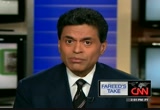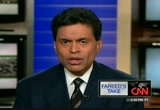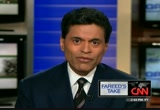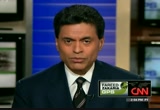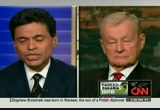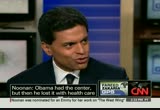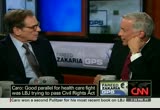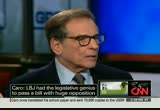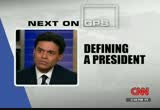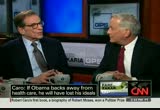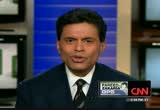tv CNN Newsroom CNN January 24, 2010 5:00pm-6:00pm EST
5:00 pm
children and yuth were really the backbone of the movement. >> dr. dorothy height, thank you so much. we are out of time. and sonia sanchez, thanks so much, ladies, for being with us. it is a beautiful exhibit. on its way now to dallas and then philadelphia. thanks so much. >> thank you. >> thanks to you at home for hanging in there with us through this hour. don lemon is coming up for the 7:00 eastern hour. right now we are going to fareed zakaria with "gps." welcome to our viewers in the united states and around the world. i'm fareed zakaria. we see barack obama from two lens this week. on the one hand, he's the president. directing america's formidable might to ease the plight of millions in haiti. on the other, he's the de facto head of the democratic party. a party that just suffered a major electoral loss. there's lots of analysis what went wrong for the democrats, whether the country is in ideological terms to the left or
5:01 pm
sxrit what else this means for obama's presidency. is he a lame duck? let's start with some historical perspective. obama's approval ratings one year into his tenure are roughly the same as ronald reagan, bill clinton, jimmy carter's. the two bushes had higher ratings. 41 because of the collapse of the soviet union. and 43, because of 9/11. and the rallying effect that had on the presidency. so obama's situation is not dramatically worse than many of his predecessors which means it can be corrected. but what should he do? i would put it very simply. obama needs to start acting like a president and particularly the president he campaigned to become. for the last six months, barack obama has seemed to be not a president but a prime minister. he's not outline ad broad vision for the country and put forward grand plans to solve the nation's problems. instead his white house has been busy slicing and dicing its
5:02 pm
programs to pick up a congressional voted here and there and so involved in the minutia of the legislative process that it lost sight of the broader public. and the process of making legislation which was marked famously compared to make sausages, obama lost sight of his big ideas. the health care bill was riddled with so many gifts and giveaways to special interests from the basic desire to avoid any hard decisions on costs through the special exemptions to five states and to the fancy deal on cadillac ambulance that exempted the unions, and the few in america believed the resulting bill could truthfully be called reform. barack obama campaigned as the man who would bridge the divides of right and left. reach out with ideas to red and blue america and create a united states of america. now, the republicans have been very obstructionist. they have played hard to get. but suddenly on health care, obama never really tried to make
5:03 pm
the compromises that might have gotten some key conservatives onboard. and in a recent "wall street journal" poll, obama did all right on most categories of leadership. the public still admires him as a person and as a leader. but his worst score was in response to the question has he changed the way washington works? see, america wants a president who at least tries to effect that change. that's the change that we all want to believe in. now, i have a great program for you today. on haiti some surprising insights from a great foreign policy. a stellar panel of sxwrirs historians who have studied great presidencies and political movements. i have told you what i think obama should do. we will hear what they think. >> i think we live in a time of collapse and collapsing institutions. >> i think i'm -- at the end of the year, how monumental his
5:04 pm
aims have turned out to be and two, how hard it is to achieve them. >> president obama built a movement to get himself elected but he didn't build one to govern. >> let's get started. humanitarian crisis in haiti is still acute and i think we all agree we must do everything we can to alleviate the immediate suffering and help those we can. what of the future? we have seen what can happen in these tragedies. first a massive outpouring of sympathy and aid. once the immediate crisis passed, everybody goes home and things occur. what will the united states do? chooses to stay and rebuild haiti, one more nation building project on an already packed nation building agenda. iraq, afghanistan, maybe yemen. now haiti. what's realistic? joining me now to talk about haiti and, of course, obama's
5:05 pm
first year in office, we have the scholar and statesman mr. brzezinski, former national security adviser under former president jimmy carter. welcome to the show. >> it is good to be with you. >> first answer for me, this problem of what we do beyond the immediate crisis in haiti. how should we think about this? one level a terrible humanitarian crisis. another level, let's be honest, it is a national security problem. compared with the larger ones. how much attention, you know, should be devoted to it? >> well, i think it is quite clear that initially we have to make a maximum effort to help. i feel a little frustrated -- by what seems to me to be a rather slow unfolding of the aid effort, it ought to be much more energetic and ought to be someone visibly in charge and we don't need high-level grandstand visits to haiti by our foreign or domestic leaders.
5:06 pm
but we need some evidence of american direction of the effort. beyond that, i think we ought to have some arrangement involving the u.n. which perhaps could create some accommodation with the haitian government allowing for form of transitional international -- for the recovery of haiti. this will take a very major international effort, the united states, of course will have to take the lead in it in terms of putting resources into it. but i would think that other countries particularly latin american countries, even central american countries, ought to be heavily involved. >> brazilians were the peacekeepers. what you are talking about is a kind of colonialism that we will never call that because it is, you know, u.n. mandated and international rather than one country. because the haitian government as far as i can tell has collapsed in every sense of the word. it has collapsed physically, collapsed politically, and so
5:07 pm
there is simply nothing there. and that means you have to have some kind of, as i say, colonialism that not speak its name. >> yes. but, fareed, i would take exception to the word colonialism because that implies two things. first of all, colonials -- secondly, imperialism, prolonged on the nation. transition transitional under the u.n. and with other countries involvement, not just the united states because of the troubled history that we have with haiti. but i think that the haitians themselves with probably accept some arrangement of that sort because without it, i think recovery is going to be slow and painful and the country is really in a dismal condition. >> if you were back in your old job, national security adviser, would you start worrying after a
5:08 pm
few weeks that this problem, this crisis, was sucking up a lot of time, energy and attention of the government which had to be focused on iraq, afghanistan, yemen, somalia, relation was china, russia, india? >> absolutely. and this is why i would say to the president delegate the problem in haiti to a single coordinator. someone presumably with military connection or military status and with experience in large scale and major emergency undertakings. >> when you look at haiti, you are also a scientist, political scientist, scholar of comparative history, this is one of the most desperate countries in the world. is it conceivable that after a body blow like this that you will be able to transition to
5:09 pm
something -- some stable meaningful political order that will endure? >> haiti has one very important resource. which, unfortunately, has been underutilized. but it is an important resource. human capital. it is rather remarkable the way haitian communities perform in america. and there have been studies of that and they show that the haitian community has grichb the right opportunity thrive on a dynamic and very creative. and they have actually a kind of -- tradition of self-development which is rather impressive. i think that if the framework for that country could be improved through international assistance through some transitional arrangements which permit some u.n. supervision, i think the human capital in haiti could help to recover and to overcome the kind of obstacles
5:10 pm
and tragedies that the haitian people have had inflicted upon them. either by nature or by poor, oppressive corrupt governments. but that would require this international effort under some sort of the u.n. flat -- you rightly said, it shouldn't be viewed as coal ownialism and could appear to be colonialism to haitians if we are crude about it and it is us who do it. we ought to be the measured party in that effort because most of the resources probably will have to come from us. as you said, there's brazil, there are other countries in the area that would be involved. the french have moral obligation, cultural link. they could be more involved. so once we let the human capital sort of assert itself, i think haiti could be quite attractive. >> what lesson do you draw as from the fact that you look at haiti and you look across the border at the dominican republic
5:11 pm
sxlik dominican republic is doing rather well for a third world country and a growing middle class and peaceful and stable. how can the two countries have had such different paths? >> well, they had to some extent slightly different political experience in haitians, just bad luck with some particular leaders. and then the worst is even very specific phenomenon of deforestation in haiti which the dominicans wisely did not emulate and that damaged that cultural base in haiti. >> there are people that make broader claims, brett stephens, foreign affairs columnist more "the wall street journal" says you look at haiti and it is the best case against foreign aid. and we should learn from this you can pour all this money in countries like haiti and nothing ever changes. why try it one more time? >> i think that is a dangerous argument because it is sort of
5:12 pm
suggests subtly or maybe unintentionally a kind of human fault among the haitians which i don't see and which on the contrary as i see the haitians themselves i see something quite different. i think it has much more to do with the historical confection and framework and some fundamental socio-economic errors such as deforestation. such as the more important causes of the failures of haiti. it wasn't always driven by the most humanitarian motives. >> so -- you have some -- hold out some hope for haiti? >> well, the people. i think that the people themselves right now are too traumatized, have been so badly governed, and are in such a state of shock they really do need immediate external
5:13 pm
assistance and i would like to see some visible demonstration of coordinated american effort that takes some chances even in the way it operates. drops food or supplies in places which are needed. creates -- sort of military controlled zones in which things are simply deployed from air and distributed even very dramatically by hand. things of this sort because people are dying every single day. but beyond that, as we talked, some form of international sponsored arrangement of a transitional character to accelerate the recovery of the country and more ambitious basis. >> always a pleasure to have you on. thank you so much. >> it is good to be with you, fareed. you run a very good show. raise it is right kind of issues. >> thank you, sir. we will be right back. >> i think we live in a time of collapsed and collapsing institutions. i think people have less faith
5:14 pm
in the great institutions than in jfk's day and eisenhower's days they had faith in. journalism, government, the church. they've served for decades as a golden, tasty sidekick to the all-american meal. french fries, and our national passion for them, are legendary. classic. iconic. but times change. and people want better foods. so cargill helped a restaurant chain create a zero-trans fat cooking oil for their french fries. using select canola plants and inovative processing techniques while preserving their famous taste. because no one wants to give up a classic. this is how cargill works with customers. would you like a pony ?
5:15 pm
5:16 pm
well, you didn't ask. even kids know when it's wrong to hold out on somebody. why don't banks ? we're ally, a new bank that alerts you when your money could be working harder and earning more. it's just the right thing to do. garlique's clinically tested ingredient maintains healthy cholesterol naturally. eat right. exercise. garlique. at the top of the program i gave you my analysis of where president obama went wrong in his first year. now i want to offer other points of view. some from a group of people studied presidents and politics for many years. let me put it this way, if i were barack obama i would ask their opinions.
5:17 pm
joining me now, robert, two-time pulitzer prize winner and author of biographies on lyndon johnson. peggy noonan, "wall street journal" columnist and writer who authored many of ronald reagan's greatest speeches. not to mention five bestselling books. wallster isaacson, one-time chairman and ceo of this network, cnn and the author of great biographies. among them benjamin franklin and henry kissinger. "new york times" editor and author of a new book "the death of conservatism." welcome to all of you. let me first begin with the poll numbers. one year into his presidency, what i'm struck on, i was looking at this historical polls and he's roughly where reagan was and a little bit ahead actually of clinton. behind both bushes. 41 because of the collapse of the soviet union and 43 because of 9/11. they are all lower than
5:18 pm
eisenhower and kennedy. who were in the high 60s and low 70s. is that about watergate? is that about the media? is that about a different partisan climate? or were eisenhower and kennedy an exceptional bipartisan moment in american history? >> i do think that poisonous partisan atmosphere, media environment, everything helps to tear down a person's ratings. and, you know, a year ago on this show, i must admit, peggy and i wrestling together and peggy was making the argument he is biting off far too much and can't do all these things. no, have you do all these things. i turned out to be wrong. they did overreach and did bite off more than they could chew. >> i think we live in a time of collapsed and collapsing institutions. i think people have less faith in the great institutions than jfk's day and its eisenhower's they had faith in.
5:19 pm
i think that the obama -- one of the obama administration mistakes has been to not understand they were governing and taking power in a time of collapsed instigss and a time when people were not trusting the governor. when you know the people are leery and you try to do huge things, as we discussed some time back, that are also controversial things and don't have a lot of built-in support, you are looking for trouble. they looked for trouble. they got trouble. >> but part of it is also did they miss the ideological moment? >> the presidency has been delegitimized. look back over the past three presidents. bill clinton was declared essentially ill legitimate by some very powerful figures in the house, including dick armey, because he got 43% of the vote. the same percentage, nixon got from '68.
5:20 pm
george w. bush was considered ill-legitimate by many on the left because of the florida round. barack obama's lineage and patry moany and nayive origin are being questioned. we do not regard the presidency the way we once did. and i think that president obama suffers with that. one other point, i was looking at a very interesting piece george packer wrote in ""the new yorker"" right after the election. he said president obama built a movement to get himself elected but he didn't build one to govern. and that may have been a miscalculation. i think -- talking about. there was not necessarily an ideological -- >> i think there is a campaign -- campaigned as a presidential figure but he governed, particularly the last six months, more as a prime minister. slicing and dicing the legislative process. which was something that -- >> acting almost like a prime minister. and he hasn't -- i mean, those of us who thought that he was going to be a great consensus builder and this would have
5:21 pm
restored the strength of the presidency. he was perfectly placed to do that. and i think that the pivot point came in august when not only did you have the tea party rebellion out there, but you also had the decision made in the white house and at the exact same time to go for their own democratic health care bill and instead of continuing to try to fight for consensus bill. >> can i say -- i think one of the big headlines on obama's first year is that part of what we are referring to is he lost the center. he lost independence. when he came in in 2008, obama, he had the votes of the independents of america. they voted like democrats. only a year and a half later, 2010, they are voting like republicans in massachusetts and new jersey. and in virginia. you cannot -- when you are a modern president in this ferocious political environment, hold on to anything but the center if you want to prosper.
5:22 pm
that's where it is. that's where it is at politically. the suburbs are where it is at. and they are departing him. i think it didn't start in august. i think it started earlier when the president decided that the meaning of his first year would be domestically would be health care. it was a mistake and he also decided and guess what, i'm going to take my personal popularity and stature and i am going to give it to the unpopular ill-thought of democratic congress. shouldn't have done that. >> i think that's -- you tell the story about james baker you were telling me. >> james bake her a wonderfully -- the 1980s working for president reagan here, had a wonderfully sure sense of the stature of his president, ronald reagan. and his popularity. and he knew that he didn't want his president to be mucking around with -- these are not his words but those lowlifes and unpopular and disliked small figures in the american
5:23 pm
congress. >> by which he meant the republicans. >> let's just say he meant those in congress. reagan was going to be kept apart and as a leader, heightened and just apart, obama and his people mucked up obama with these congressional critters who nobody in america likes. >> except that lyndon johnson did this and what managed to do it well. he was the -- one person who was able to be both president and prime minister. >> i have been thinking all this week as we talk of -- as we see how hard it is to get anything through congress and exactly -- analogous situation was lyndon johnson trying to pass the first civil rights bill since reconstruction in 1957. and that was as at least as hard as this, the southerners can controlled and the 11 most powerful committees in congress. and they said that this bill is not going through. to watch johnson get it through,
5:24 pm
vote by vote against the filibuster, you know, then they said there were 96 senators. so 34 and you can keep a filibuster going forever. the saying was that you get up to 34 and real fast in the senate. to watch johnson strip those votes away from the south, one vote at a time, is just to watch -- this is legislative genius. >> didn't he do that with the republicans as well, franklin roosevelt's transformational policies were done in a more bipartisan way? >> yes. but -- the -- but at the same time, he had the -- the similarities to the republicans today was the southern democrats. they never worked. >> both parties which -- sort -- >> both parties genius -- >> the 1950s, they were saying there were four parties in america. presidential republicans and democrats. and liberals and conservatives
5:25 pm
and congressional ones. and you mixed and matched them. one of what -- the consequences of this very powerful and important conservative movement we have seen is that in congress, republicans are ideologically unified. i was looking at something byrnes wrote about the goldwater flex 1964. and he said that the aim of these conservatives is that they know they are going to lose this election. it is to get rid of the liberals. they used to call meet, too, republicans. republicans in name only. to purify ideologically the party, they succeeded in that, what they did was to leave themselves with a party that is -- fairly uniform and in its views and so that even at the height of his popularity, barack obama couldn't get republican votes for the stimulus package. >> that's exactly the opposite of what is happening now, sam. purism took a hit in new jersey and virginia and in
5:26 pm
massachusetts. people were practical. they voted on issues. they voted for republicans who are conservative economically but are very nonsnarling and not guys that you can look at and say that is an eyideolog. i interviewed scott brown. the first thing he did was compliment barack obama. it is something new going on. a pragmatism among the tea party people, they were not 100% on the -- >> what did lindsey graham say after the election on tuesday? he said if you are a conservative in a red state, don't think you don't have to be -- you don't have something to worry about which seems so odd. >> meaning what? >> meaning that there is among the tea party group, i'm not convinced that peggy is right about the tea partiiers
5:27 pm
themselves. he said this is a victory for the independent majority. so he distanced himself from both parties. if you read the reconstruct the times had of how the election was run and if you look at the anxiety, colorado, there, as well, there seems to be a strain -- tension building within the republican party and elites and its grassroots base. >> that's again going on a while. new england got -- teddy kennedy's seat just between a republican. something is going on. >> you are talking -- only in terms of ideology. there is another level of government which is getting something done. now, what we have seen here is a very practical thing. a president dealing with congress. now, we are in a democracy. congress -- talking -- governed bylaws. laws means congress passing something. now, you take acts in the pass that seem impossible to get through, sorry to keep mentioning lyndon johnson.
5:28 pm
what is legislative genius? he wants to get the first civil rights bill through, and he needs a -- southerners let it go to the next level. if they can get a guarantee that they can filibuster and hold it up, future level, johnson needs ten or 12 votes that he can deliver to the south. he says what can i find -- he finds the western democrats, what do they want? he says i have to find something that 12 senators want enough to go along with the south on this. and he finds hell's canyon dam, the snake river which divides idaho oregon. he says they have been fighting for this for 20 years, for federal power. and the south, if i can get richard russell, head of the southern democrats, to agree to give them hell's canyon the south will let the bill move forward to the next level. and he gets 12 votes. if we had seen a stroke of genius -- what else legislative genius? johnson is on the floor.
5:29 pm
let me finish. he -- there is a moment where he's going to lose. there is about to be a vote called and will lose. standing next to the senator from new mexico. clinton anderson and sees anderson, liberal, has been doodling on a paragraph and changing it around and says that will work. he says, introduce it. introduce it now. anderson i can't introduce it. i'm too liberal. get a good republican. looks around and says get aiken, george aiken. aiken introduces it and the bill passes. we don't see legislative genius like that anymore. i'm sorry. >> no, no, no. it is a good point but one of the problems -- i think we have seen is a little too much horse trading, too much, you know, cornhusker deals and my own state of louisiana deals. and i think that the big difference between them and now which you have put your finger on, in a way history has gone, leave aside massachusetts, parties have become more ideological. back then when you were writing about the civil rights bill, had
5:30 pm
you very conservative southern democrats and very liberal, you know, kennedy democrats, now you have seen the ideological party. and this goes against what the founders of the country hope would happen. i mean, benjamin franklin was always saying, you know, compromisers may not make great heroes but make great democracies. we have to find the common ground. >> the real legislative genius, i think, would be obama having reached out to the republicans on health care. and had he gone to john mccain and said your signature campaign proposal, the elimination of the deduction for employers on health care, if i were to accept that, john, would you -- would you support it? then -- you transform the debate. what he instead did was ee he only sought approval within the congressional democrats and they need to get the last ten democra democrats, making sordid compromises and exceptions to five states. then there -- giving them electricity and doing things -- >> greedy for glory. >> we are going to have to take
5:31 pm
5:32 pm
we don't go lower than 130. big deal, pe 5uade him. is it wise to allow a perishable item to spoil? he asked, why leave a room empty? the additional revenue easily covers operating costs. 65 dollars is better than no dollars. okay. $65 for tonight. you can't argue with a big deal. who need okay. $65 for tonight. assistance getting around their homes.
5:33 pm
there is a medicare benefit that may qualify you for a new power chair or scooter at little or no cost to you. imagine... one scooter or power chair that could improve your mobility and your life. one medicare benefit that, with private insurance, may entitle you to pay little to nothing to own it. one company that can make it all happen ... your power chair will be paid in full. the scooter store. hi i'm doug harrison. we're experts at getting you the power chair or scooter you need. in fact, if we qualify you for medicare reimbursement and medicare denies your claim, we'll give you your new power chair or scooter free. i didn't pay a penny out of pocket for my power chair. with help from the scooter store, medicare and my insurance covered it all. call the scooter store for free information today. and.
5:34 pm
we are back with our distinguished panel of experts, historians, pulitzer prize winners. let's talk about the ideological moment. part of what happened here is that the end of the cold war produced a new eyed oriole lodge cam landscape. the people that mapped it out best were bill clinton and tony blair. they understood, as you said, at the end of the day, you governed from the center if you veer too far -- veer like newt gingrich did, you get killed. if you veer too far to the left you get killed. we r we still in that world? mine -- >> i think the nomination of mccain and obama showed a yearning for governing from the center and people that could reach across the aisle. that's the way both cast themselves in the primary and then i think that there were a lot of factors that pulled that apart. when churchill's party lost in 1945 election, one of his
5:35 pm
colleagues said that winston, it is a blessing in disguise and said maybe so but it is an incredibly good disguise. some way this is a blessing in disguise, incredible as the disguise is. it says no, you have to emulate the scott browns and the independents who are able to reach to the center. >> you would argue that it is the giving up of great liberal ambitions and hopes. >> yes. i think that -- we have the yearning in this country, symbolized by embodiment in obama's election, a yearning for idealism. more than ideology. we are losing that now in the squabbling in congress which is why i just keep returning to gee, you have to have someone who knows how to get things done. he wants, i think, obama has shown us that he wants his presidency to be truly transformational. i think most people would agree that some ways this country needs to be transformed. no one would argue 50 million
5:36 pm
people shouldn't have -- >> where's it going to go? we have to get to this. where is it going? ronald reagan, same poll numbers, very bad, bloomy moment. people were -- a book wasyen that says he will not run for re-election, he's doing so badly. how did he -- what should obama do? >> democrats are understandably desperate for parallels. how lovely they can point to 1982 when a popular person, popular american president, that had a very rough midterm election. a very rough political environment. i don't buy it as a parallel. many reasons, here's just one. one of obama's biggest problems in his first year was that his preoccupations were in this direction. and the preoccupations of the american people were in this direction. they were not on the same page. american people are thinking economy, foreign affairs national security, he's doing health care, cap and trade. stuff that these people thought was a little daffy to be concentrating on. the reason one thing we haven't
5:37 pm
mentioned is, the great recession helped shape everything this year. all right. reagan on the other hand, '82, was on the same page of the american people. he had two preoccupations, the economy, bad shape, and inherited recession and soviet union. focused on them like a laser beam. obama didn't focus on the great issues of his moment. it is the great problem with his first year. >> you were covering national politics for "time" magazine. >> yes. exactly. i think to pick up on bob's point, he does want to be a transformational president. but you can't transform the country on the purely partisan lines. i don't think. transformation has got to come the way lbj did it and franklin roosevelt did it and every president since andrew jackson, the only one to do it -- i think the country is best governed and transformed from the center. >> future of conservatism,
5:38 pm
though. because the point you make in your book is that even if they -- i'm going to extrapolate. even though there was a political revival of conservatism you don't see an intellectual revival. the william buckleys yielded to the rush limbaughs and sean hannity was the prominent and important exception of peggy noonan. >> it is interesting that there were a number of books about a possible republican and conservative revival. published at the end of bael years p.m. david fromme wrote one. the end of the bush years. and michael gersten wrote one. they were accepting what seemed to be the shift in the inevitable interrelation between government and society. those ideas have not been picked up at all as far as i can tell by the move many on the right.
5:39 pm
back in the heyday -- >> tea party is not about embracing government. >> gee, i think -- when you are talking about is a conservative intellectual acquiesceens of real. that was true in the '60s and '70s and 80s. ronald reagan didn't walk in and say guess what, government is over. i am ending it. he lived with the reality he had. conservatism, we are living in a time and this will no change, when government is a player and a presence in american life. but if you approach that fact with conservative thoughts, just might wind up governing a little better than if you approach it with other thoughts. >> brings up a great lesson of reagan, too. it is in your book. which is even though he was very, very firm in his convictions, and he anti-communist, smaller government. he is the one that most reached out to gorbachev and said look, we are going to -- then he
5:40 pm
reaches out to tip o'neill. and he helps transform things with social security. >> by the way -- >> since working with reality which you must do. >> exactly. working with reality and standing firm here convictions but knowing where to find the common ground. whether it is with gorbachev or on the tax and the social security compromises that he and tip o'neill could do. that's what we are missing today. >> we have to take a break and we will be right back. >> on the health care bill, in particular, i think that in political terms if he backs away from that, he will deal with it because that's what people see in him. ♪ ♪ [ male announcer ] the cadillac cts sport sedan. one of car and driver's 10 best for the third year in a row. ♪
5:42 pm
each year food executives come to grasse, france to work with roxane. here in this centuries old town cargill creates flavors. and food companies come to collaborate with cargill. creating unique tastes from thousands of rare flavors. helped by roxane... an ingredient mixing robot. and a team of flavor experts.
5:43 pm
5:44 pm
he should go back and see way need a health care bill. whether he revisits and starts over again, that ideal should not be lost. i think in political terms, if he backs away from that, he will be lost because that is what people see in him. what is his presidency going to be? you know, we haven't even talked -- you were talking about reagan and gorbachev. he has had such immense decisions. he came in an economic cries, huge economic crisis. came in with terrorist problems. he stretched military. budget that was already -- he had immense problems. you say where does he stand at the end of the first year? i think that we are going to look back at this point and n three years and -- say -- i hope we said that gee, he's risen up from this little point right here. >> we will not wait three years. we will reconvene this panel sooner than that. thank you very much and we will be right back.
5:48 pm
hello. don lemon live at the cnn world head quarters in atlanta. a look at your headline. a chilling new audiotape purportedly from al qaeda leader osama bin laden. he claims responsibility important the christmas day attempt to blow up a northwest airlines flight en route to detroit. threatens more attacks on the united states. three american service members were killed today in southern afghanistan. military officials say they were hit by roadside bombs in two separate attacks. as a survivor was pulled from the rubble yesterday, thousands of people have signed an online petition. they are pushing for rescue efforts to continue at a collapsed hotel in port-au-prince. i'm don lemon and will see you at the top of the hour. fareed zakaria with "gps" continues in a moment.
5:49 pm
5:50 pm
when i test at night or after i eat makes a big difference. a good diet and testing your blood sugar regularly can help you manage-even reduce-the risk of complications. th a wide selection of most brand-name meters. and, all the help you need to understand your meter. if you're over 65, have diabetes and are on medicare, call now and we'll send you a free meter. it offers alternate site testing, so you can test on your arm. no more pricking your fingers. so it's less painful. it makes a big difference. and to make it even less painful, the cost of your diabetes testing supplies may be covered by medicare. join over a million others who have chosen liberty medical. call now and get your free meter. plus, for a limited time, get a free cookbook when you join. call t number on your screen.
5:51 pm
5:52 pm
now, the what the in the world segment. what caught my attention was this making way for. this the first one, of course, "avatar", the blockbuster james cameron movie that is expected to become the world's top-grossing film of all time. i'm seeing it this weekend with my family. "avatar" made more money in china than any other film in history according to its distributor 20th century fox. after three weeks this theaters, china decided to pull all the 2-d copies of "avatar" off, leaving only a few 3-d and imax copies. only one in ten theaters in china is able to show these souped up versions of the film. chinese media says "avatar" is pushed aside for the film the beijing government has a particular interest in, its own version of a big-budget blockbuster this biopic about the ancient chinese philosopher,
5:53 pm
confucius. the film starring action hero chow yun fat was partially paid for by the chinese go beijing denied it pulled "avatar" to make way for the only movie. the state administration of radio, television says it was a simple matter of economics. the 2-d version of the film wasn't making money. despite china's denials, no one disputes that china does prevent foreign films from entering the market. only 20 foreign films are allowed to be in china each year. the chinese government now freely admits it wants to develop local champions and will not give western companies unfettered access to the chinese market. in the past, chain know needed the united states and the western general as a source of capital, market for its exports, as a political al like provider of technology and know-how. but it is possible that some chinese leaders decided they
5:54 pm
don't need us anymore, relationship has changed nism nation is free to act as it wishes, but i would suggest chinese leaders want to look at the confucius film they paid for. one of the great chinese sage's sayings was a version of the golden rule. he said if in his a nalex, "never impose on others what you do not want done to yourself." if the chinese turn away from the west and become insular and nationalistic it might provoke a similar reaction here and that wouldn't be good for the world or for china. we will be right back. rogaine?
5:55 pm
5:56 pm
assistance getting around their homes. there is a medicare benefit that may qualify you for a new power chair or scooter at little or no cost to you. imagine... one scooter or power chair that could improve your mobility and your life. one medicare benefit that, with private insurance, may entitle you to pay little to nothing to own it. one company that can make it all happen ... your power chair will be paid in full. the scooter store. hi i'm doug harrison. we're experts at getting you the power chair or
5:57 pm
scooter you need. in fact, if we qualify you for medicare reimbursement and medicare denies your claim, we'll give you your new power chair or scooter free. i didn't pay a penny out of pocket for my power chair. with help from the scooter store, medicare and my insurance covered it all. call the scooter store for free information today. now for our question of the week. last sunday i asked, once the immediate crisis has passed, do you think the united states should spend large amounts of money and resources to rebuild haiti? how much can or should the u.s. do to rebuild a country with problems as deep as haiti's? most of our viewers said, yes, the u.s. must help, and almost all added, if america doesn't
5:58 pm
take the lead, who will? many, of course, cited humanitarian concerns, but others brought up security. andrea simpson of pasadena, california, said, "given haiti's poverty and chaos, if we don't help, dictators and even jihadists may see an opportunity to move closer to our shores." michael kelly of homdell, new jersey, was one of the dissenters said simply, "what are we going to do? borrow more money from china to rebuild haiti?" for this week, i want to know about president obama and the massachusetts message of the election of republican senator, scott brown. there seems little doubt this was a message from voters. my question is, how should obama respond? should he move closer to the left, his core constituency, or toward his nemesis, the right? and of course, there's the center, the place from which bill clinton governed successfully. so, should president obama move left, right or center?
5:59 pm
let me know your thoughts. a reminder, i love reading your e-mails, but please include your name and location when you send them. as always, i would like to recommend a book. it's called "the death of conservatism" by sam tanenhaus, who you'll recall was on the program today. the tanenhaus premise is compelling and not so easy to refute. today's conservative movement, he says, is dying because it's harshly ideological, very different from the grounded, philosophical movement of the past in which there were great thinkers like william f. buckley, irvine crystal. those were the people who personified the right. today, rush limbaugh speaks for the movement. tanenhaus argues that right now, conservatism is a movement that serves as construction and recrimination that does not offer a thought-out set of ideas.
254 Views
IN COLLECTIONS
CNN Television Archive
Television Archive  Television Archive News Search Service
Television Archive News Search Service 
Uploaded by TV Archive on

 Live Music Archive
Live Music Archive Librivox Free Audio
Librivox Free Audio Metropolitan Museum
Metropolitan Museum Cleveland Museum of Art
Cleveland Museum of Art Internet Arcade
Internet Arcade Console Living Room
Console Living Room Books to Borrow
Books to Borrow Open Library
Open Library TV News
TV News Understanding 9/11
Understanding 9/11
